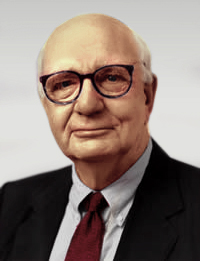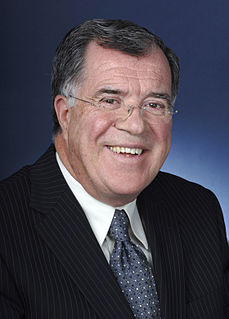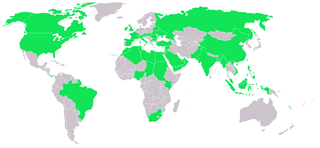
The Oil-for-Food Programme (OIP), established by the United Nations in 1995 was established to allow Iraq to sell oil on the world market in exchange for food, medicine, and other humanitarian needs for ordinary Iraqi citizens without allowing Iraq to boost its military capabilities.

Paul Adolph Volcker Jr. was an American economist. He served two terms as the 12th Chair of the Federal Reserve from 1979 to 1987. He was nominated to position by President Jimmy Carter and renominated by President Ronald Reagan. He was widely credited with having ended the high levels of inflation seen in the United States during the 1970s and early 1980s. After his retirement from the Fed, he chaired the Economic Recovery Advisory Board under President Barack Obama from February 2009 until January 2011.
A royal commission is a major ad-hoc formal public inquiry into a defined issue in some monarchies. They have been held in the United Kingdom, Australia, Canada, New Zealand, Norway, Malaysia, Mauritius and Saudi Arabia. A royal commission is similar in function to a commission of inquiry found in other countries such as Ireland, South Africa, and Hong Kong. It has considerable powers, generally greater even than those of a judge but restricted to the terms of reference of the commission. These powers include subpoenaing witnesses, taking evidence under oath and requesting documents.
Benon Vahe Sevan was the head of the United Nations' Oil-for-Food Programme, established in 1996 and charged with preventing Iraq's government from using the proceeds from oil exports for anything but food, medicine and other items to benefit the civilian population.
The Mariam Appeal was a political campaign in the United Kingdom (UK) established in 1998 which ceased operation in 2003. The objects of the Appeal as stated in its constitution were "to provide medicines, medical equipment and medical assistance to the people of Iraq; to highlight the causes and results of the cancer epidemic in Iraq and to arrange for the medical treatment of a number of Iraqi children outside Iraq". The campaign was founded by the politician George Galloway, then a member of parliament, Princess Sarvath, wife of then Crown Prince Hassan of Jordan, was patron of the Appeal.
The Royal Commission into the Building and Construction Industry, or informally the Cole Royal Commission, was a Royal Commission established by the Australian government to inquire into and report upon alleged misconduct in the building and construction industry in Australia. The establishment of the Commission followed various unsuccessful attempts by the Federal Government to impose greater regulation upon the conduct of industrial relations in that industry.
The Paul Volcker Committee was formed to investigate alleged corruption and fraud in the United Nations Oil-for-Food Programme in Iraq.
AWB Limited was a major grain marketing organisation based in Australia. Founded in 1939 by the Government of Australia as the Australian Wheat Board, in 1999 it became a private company, owned by wheat growers. It was acquired by Agrium in 2010.
Andrew Alexander Lindberg is an Australian businessman.
Terence Rhoderic Hudson Cole,, is an Australian jurist, known best for presiding over two Australian Government Royal Commissions.
Trevor James Flugge is an Australian farmer and businessman. He is best known as a former official of the Australian Wheat Board (AWB). He joined the board in 1984, was chair of AWB in 1995–2002, and was present at meetings in Iraq which were linked to the Oil-for-Food scandal, and an inquiry by the United Nations.

The Royal Commissions Act 1902 is an Australian Act of Parliament which authorises the Australian Governor-General to initiate an investigation, referred to as a Royal Commission. Royal Commissions are a major independent public inquiry into an issue, initiated by the Australian Government. They often investigate cases of political corruption or matters of significant public concern.

Paul Thomas O'Sullivan, is an Australian diplomat and public servant who served as Australia's High Commissioner to New Zealand and as former Director-General of Security. O'Sullivan accepted a role as a political advisor for the Abbott Government in 2013.
The Wheat Export Authority (WEA) was established 1 July 1999 as part of restructuring the former government-owned Australian Wheat Board in preparation for its sale as AWB Limited. It was felt that a number of the tasks carried out by the previous Australian Wheat Board would not be appropriate for a privately owned body; thus, the WEA was established. The WEA's role was determined by the Wheat Marketing Act 1989 and its operations were funded by a charge on Australian wheat exports.
The Oil-for-Food Program Hearings were held by the U.S Senate Permanent Subcommittee on Investigations beginning in 2004 to investigate abuses of the United Nations (UN) Oil-for-Food Programme in which the economically sanctioned country of Iraq was intended to be able to sell limited amounts of oil in exchange for vital food and medicine for its population.
The AWB oil-for-wheat scandal refers to the payment of kickbacks to the regime of Saddam Hussein in contravention of the United Nations Oil-for-Food Humanitarian Programme. AWB Limited is a major grain marketing organisation based in Australia. For much of the 20th and early 21st century, it was an Australian Government entity operating a single desk regime over Australian wheat, meaning it alone could export Australian wheat, which it paid a single price for. In the mid-2000s, it was found to have been, through middlemen, paying kickbacks to the regime of Saddam Hussein, in exchange for lucrative wheat contracts. This was in direct contradiction of United Nations Sanctions, and of Australian law.

United Nations Security Council resolution 1538, adopted unanimously on 21 April 2004, after expressing concern about the administration and management of the Oil-for-Food Programme in Iraq, the council ordered an inquiry to investigate the matter.
A single desk is a monopoly marketer and buyer of a product with multiple suppliers. They were common in markets for agricultural produce.
The wheat industry of Australia has been organised by government regulation, by both the Commonwealth Government and state governments.




